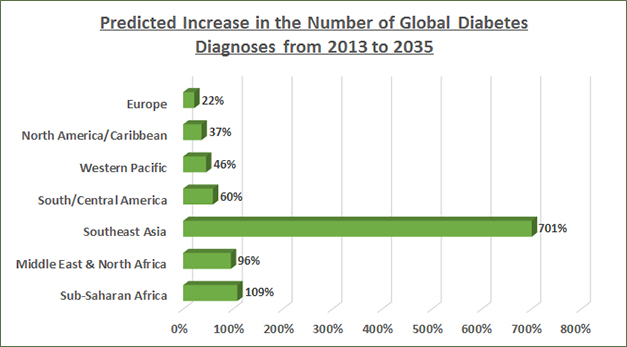On August 31, 2015 Google Life Sciences and French pharma giant Sanofi announced that the two companies will work together on new digital technology and tools for the treatment of diabetes. The overall aim of the collaboration is “to shift from episodic, event-driven diabetes care to continuous, value-based care.” Google and Sanofi aim to use miniaturised technology to provide patients with a stronger array of tools to self-manage their disease, and will utilise the collected data to provide healthcare professionals with the information needed to better support and treat their patients.
Diabetes represents one of the major threats human health globally. In 2013 an estimated 382 million worldwide were reported to have the condition, with predictions forecasting that the number will rise to 592 million by 2035. The WHO projects that diabetes will be the 7th leading cause of death in 2030 directly. However its healthcare impact is much larger than this considering sufferers are 2 to 3 times more likely to suffer from Heart Disease and Strokes, the top two leading causes of death globally. This does not include other chronic long-term complications such as nerve damage, limb amputations, loss of kidney function and blindness.

Modern optimal management of the condition requires a holistic approach based on feedback of a given patient’s glucose levels, response to treatments such as insulin or other glucose lowering medications, nutritional state, diet, movement and exercise profiles in real time. This data-driven approach has been readily adopted by Google and Sanofi.
Dr. Frank Rinaldi, Director of Market Intelligence & Innovation at Evolution Bioscience, notes that “given Google’s extensive big data analytics experience, Sanofi’s diabetes treatment knowledge, and the wider management contributions of the Joslin Diabetes Center, it would appear to be an ideal combination of knowledge assets to make a significant impact.”
Google & Sanofi’s announcement comes off the back of earlier announcements that Google will be working with Novartis’ Alcon eye care division to develop a contact lens capable of continuous monitoring of glucose. Additionally, Google had previously announced a deal with Dexcom to aid in the miniaturisation of their implantable continuous glucose monitoring device. These are exciting developments and will no doubt add value to the healthcare of those suffering from diabetes if the cost, compliance and value equation stacks up.
Whilst Dr. Rinaldi agrees that the collaboration will have positive implications for diabetics, he also states that “unfortunately these advancements are not likely to provide comprehensive solutions to a global problem in the short term. Initiatives such as those of the Indian government, who in 2012 began supplying traditional pin prick blood kits for the monitoring and detection of glucose levels, are more likely to have a significant global impact.”
“These kits cut the cost of care down to 25% of the previous imported costs for a glucose monitor, and will lower the cost of test strips to an average of 5 cents, nine times less than current imported costs. These kits are enabled with Android Apps to store the data to the cloud after performing the test. This will assist in the centralised collection of data and help in monitoring public health and determining trends related to sugar and diabetes within India.”
Follow Evolution Global Talent Attraction on Twitter, Facebook and LinkedIN to keep up-to-date with news and trends from the biotechnology, biosciences, medical device, IT and Intellectual Property industries.





